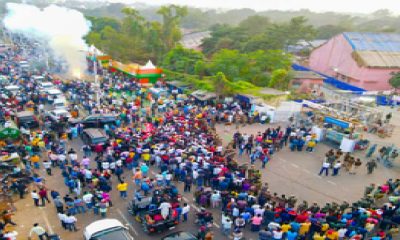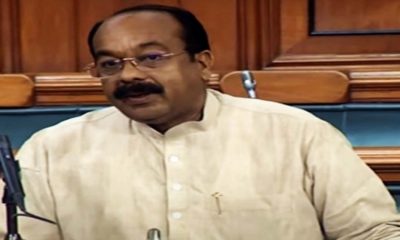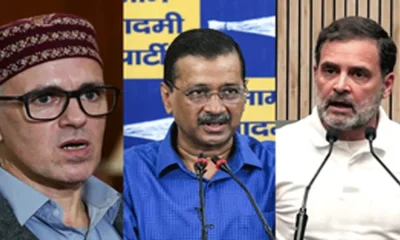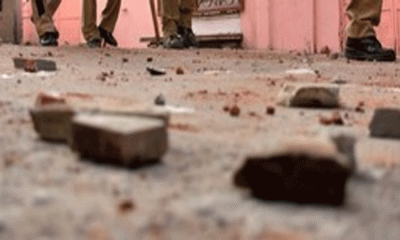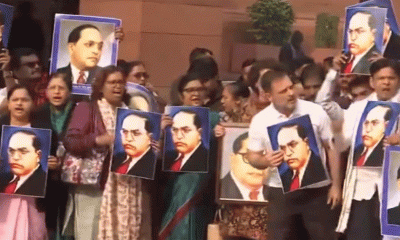Politics
Diversionary tactic, follow 1991 law in letter and spirit, says Congress
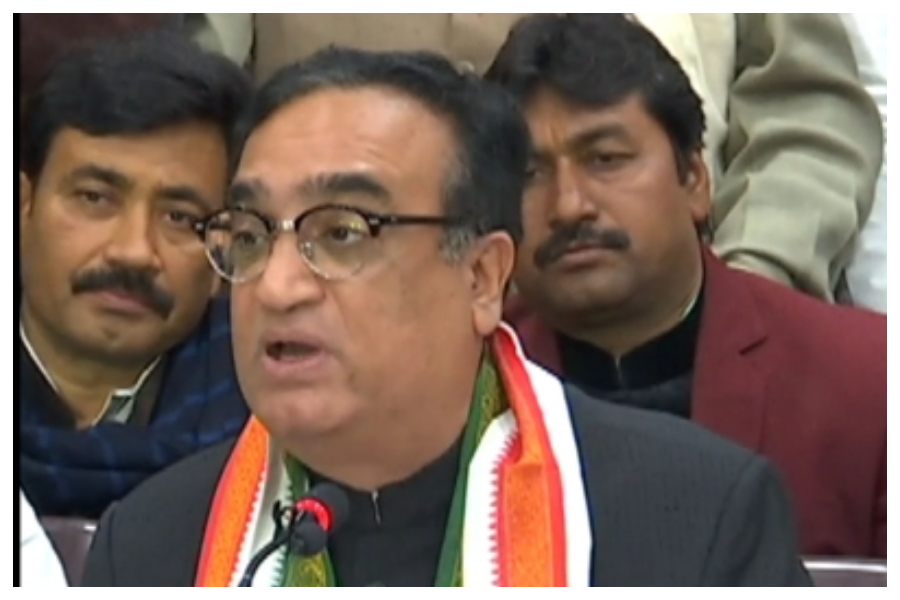
Terming the Gyanvapi case a “diversionary tactic” of the ruling BJP, the Congress has demanded strict adherence to the provision of the 1991 Act in letter and spirit saying any kind of change in the status of places of worship would lead to a massive conflict.
Seeking maintenance of status quo at the places of worship, Congress General Secretary Ajay Maken said: “The matter is under the purview of the Supreme Court and we hope justice would be delivered as the case of Ram Janmabhoomi-Babri Masjid land dispute was decided on the basis of the Places of Worship Act, 1991, which says that the religious character of a place of worship shall continue to be the same as it existed” on August 15, 1947.”
Dubbing it a “political” move, the Congress says its a “diversionary” tactic by the BJP to push the issues of inflation, unemployment and rupee downfall into the back-burner.
Recently, former Home Minister and senior Congress leader P. Chidambaram had said that the status quo on all places of worship should be maintained else it would lead to a conflict.
“Places of Worship Act was passed by the Narasimha Rao government with the lone exception of Ram Janmabhoomi. All other places should have the status quo as any kind of change could lead to a huge conflict,” he had said.
The Congress is in a catch 22 situation as the party in its ‘Chintan Shivir’ has come up with a social and economic agenda to counter the BJP. The party leaders, who deliberated over the issue, said that ideological differences with the BJP is core to the Congress politics and to fight for the people’s cause is the key takeaway from the brainstorming session. But the party has now been put on test in Gyanvapi row which could be a new controversy in political discourse as it has rethink about the strategy on the issue.
“The data of caste census of backward classes by the Congress-UPA government is deliberately not being made public by the Union government. The direct goal behind this is to deprive the backward classes of their rights. The Indian National Congress resolves to begin a decisive struggle for the demand to make the caste census data public and get the backward classes their rights,” the party has said in its resolution.
The Congress thought to fight the BJP and counter it on Hindutva through a social and economic agenda but now the party has to adopt a new stance–even Rahul Gandhi has alleged that -“Distracting people won’t change facts. India looks a lot like Sri Lanka,” Rahul tweeted.
To counter BJP’s Hindutva, Congress interim President Sonia Gandhi has announced two major mass contact programmes — one is the agitational programme against inflation to restart from June 15 and the footmarch ‘Bharat Jodo’, from October 2.
The Congress resolution also mentioned about the fight for all sections of society and particularly about the caste census, which is a big OBC push and the Congress leaders pointed that it may affect the BJP’s social engineering in many states, especially in the election-going states.
National News
Delhi HC asks DDA, MCD to act against illegal cafes, restaurants in Majnu Ka Tila, New Aruna Nagar

high court
New Delhi, Dec 24: The Delhi High Court on Wednesday directed the Delhi Development Authority (DDA), Municipal Corporation of Delhi (MCD) and the city government to take action against cafes, bars, nightclubs, restaurants and hotels operating in Majnu ka Tila and New Aruna Nagar without sanctioned building plans and in violation of safety norms.
A Bench of Chief Justice Devendra Kumar Upadhyaya and Justice Tushar Rao Gedela was hearing a public interest litigation (PIL) flagging concerns over unauthorised commercial establishments functioning in multi-storey buildings along the Yamuna river bank.
The plea sought directions to inspect and act against cafes, hotels and restaurants running without requisite permissions and sanctioned building plans.
It also urged the Delhi High Court to direct the MCD and the Delhi Fire Services to enforce the National Building Code and applicable fire safety measures in the area.
During the hearing, counsel appearing for the DDA informed the CJ Upadhyaya-led Bench that a suo motu complaint has already been registered on the portal of the special task force.
Taking note of the submission, the Delhi High Court disposed of the plea, directing the authorities to take appropriate action under law after reviewing the grievances raised by the petitioners.
“In view of the fact that a suo motu complaint has already been registered by the DDA, we dispose of the petition with a direction to the authorities to take appropriate action which may be warranted under law,” ordered the CJ Upadhyaya-led Bench.
It further directed the civic authorities to take action with expedition, preferably within three months. During the hearing, the Delhi High Court orally remarked that “half of the Delhi University students are there”, urging the authorities to ensure timely action.
In a lighter vein, CJI Upadhyaya observed, “Except the momo cart, everything shall be removed.”
The PIL highlighted that several structures in Majnu Ka Tila and New Aruna Nagar rise to “7–8 floors, with illegal basements, rooftops, and recreational facilities,” contending that the “structural and operational conditions of these buildings create an immediate and life‑threatening hazard.”
The petitioners claimed that most buildings lack staircases beyond the third or fourth floor, leaving “only small, low‑capacity lifts as vertical access.”
Where staircases do exist, they are allegedly “narrow, unlit, and poorly maintained,” and several terraces or rooftops are blocked or enclosed, leaving visitors without any effective evacuation route.
Referring to a recent tragic nightclub fire in Goa, the plea cautioned that it serves as “a stark warning of what could occur in similar circumstances”.
Maharashtra
Mumbai: Husband arrested for killing wife over excess salt in biryani

crime
Mumbai: A sensational case of wife murder has occurred in Mumbai. A man brutally murdered his wife in the Beganwadi area of Mumbai. Surprisingly, the motive behind this bloody altercation is being reported as simply “too much salt in the biryani.” Police acted promptly and arrested the murderous husband, Manzar Imam Hussain.
A Story of Old Enmity and Violence
The family of the deceased, Nazia Parveen, told police that this was not just a one-night stand. Nazia and Manzar had a love marriage two years ago, in October 2023, but soon after their marriage, Manzar’s behavior changed. He would often assault Nazia over trivial matters. About three months ago, Manzar reached the peak of his brutality, beating Nazia so severely that she broke a tooth. Daily domestic quarrels ultimately escalated into a tragic murder. Death from Salt in Biryani
According to police, on the night of the incident, December 20th, Nazia had cooked biryani at home. When Manzar sat down to eat, they began arguing about the biryani being too salty. The argument escalated to the point where Manzar became enraged and hit Nazia’s head against the wall. Nazia died on the spot from severe head injuries and excessive bleeding.
Accused in Police Custody
Upon learning of the incident, Shivaji Nagar police arrived at the scene, took possession of the body, and registered a murder case against the accused husband under the BNS section. Police arrested Manzar Imam Hussain, who was trying to escape. Police are currently interrogating the accused to piece together all aspects of this heinous crime.
Maharashtra
Kirit Somaiya and Nitesh Rane are only spreading hatred in the name of Hindu-Muslim relations, and creating suspicion is their agenda: Abu Asim Azmi
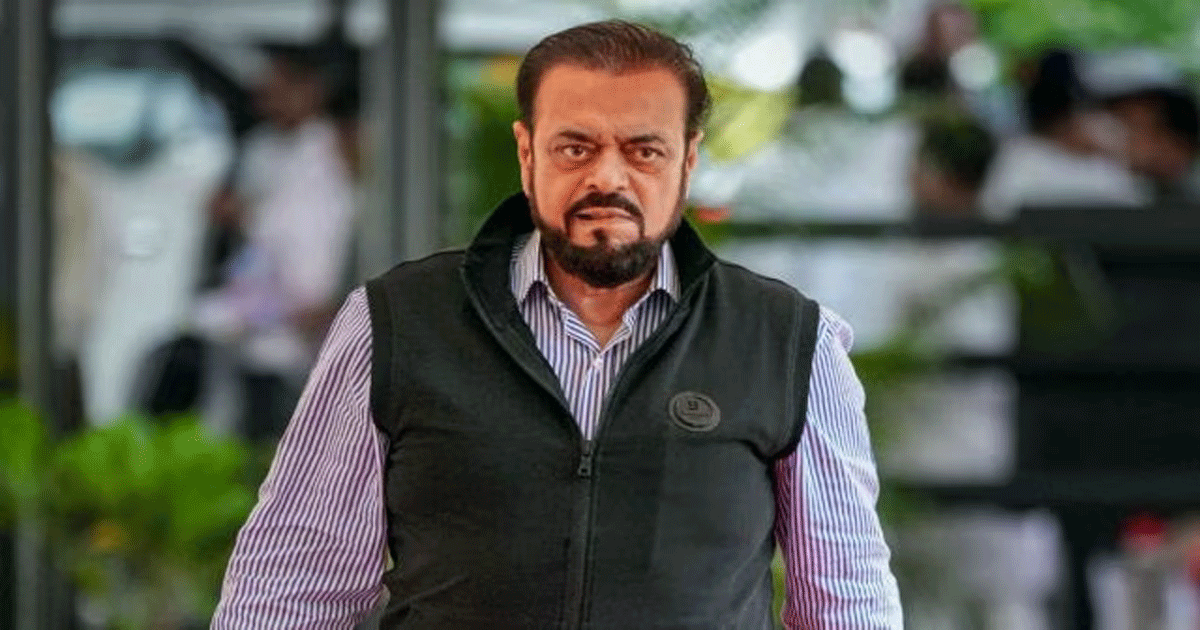
ABU ASIM AZMI
Mumbai: The BJP is engaging in politics of chaos and hatred in the name of Hindus and Muslims for votes. What wrong have Muslims done that Kirit Somaiya and Nitesh Rane are constantly spewing venom against them? They talk about brotherhood, but they have no constructive thinking or strategy to fight corruption. That’s why Hindus and Muslims continue to do the same thing day and night to benefit themselves and create divisions in society. By inciting hatred between Hindus and Muslims, they are creating an atmosphere of hatred in society. This serious allegation was made by Abu Asim Azmi, leader of the Maharashtra Samajwadi Party and member of the Workers’ Assembly. He said that when Khan became the mayor of Mumbai, where were the Muslims, but the BJP has started making it an issue and is trying to scare Hindus in the name of Muslims. Muslims say that someone from Mumbai should be elected mayor so that the city can develop, but an attempt has been made to create divisions in the name of the mayor. Based on a survey conducted a year ago, it is being said that Mumbai’s demographics are changing and the number of Bangladeshi infiltrators has increased. Azmi stated that the government needs to focus on where illegal Bangladeshis are coming from, what the government is doing, and why this infiltration is occurring. However, the way Muslims are being harassed in the name of Bangladeshis is wrong. He stated that radical Muslim leaders are advising Hindus to increase their population. Regarding Navneet Rane’s comment, Abu Asim Azmi said, “Who stopped her from having forty children? But she shouldn’t create suspicion in the name of Hindus and Muslims. This is very harmful. There is a political agenda to create hatred against Muslims. Ahead of the BMC elections, Soumya and Nitesh Rane have become agitated and are spewing venom against Muslims. This should be banned.”
-

 Crime3 years ago
Crime3 years agoClass 10 student jumps to death in Jaipur
-

 Maharashtra1 year ago
Maharashtra1 year agoMumbai Local Train Update: Central Railway’s New Timetable Comes Into Effect; Check Full List Of Revised Timings & Stations
-

 Maharashtra1 year ago
Maharashtra1 year agoMumbai To Go Toll-Free Tonight! Maharashtra Govt Announces Complete Toll Waiver For Light Motor Vehicles At All 5 Entry Points Of City
-

 Maharashtra1 year ago
Maharashtra1 year agoFalse photo of Imtiaz Jaleel’s rally, exposing the fooling conspiracy
-

 National News1 year ago
National News1 year agoMinistry of Railways rolls out Special Drive 4.0 with focus on digitisation, cleanliness, inclusiveness and grievance redressal
-

 Maharashtra1 year ago
Maharashtra1 year agoMaharashtra Elections 2024: Mumbai Metro & BEST Services Extended Till Midnight On Voting Day
-

 National News1 year ago
National News1 year agoJ&K: 4 Jawans Killed, 28 Injured After Bus Carrying BSF Personnel For Poll Duty Falls Into Gorge In Budgam; Terrifying Visuals Surface
-

 Crime1 year ago
Crime1 year agoBaba Siddique Murder: Mumbai Police Unable To Get Lawrence Bishnoi Custody Due To Home Ministry Order, Says Report



